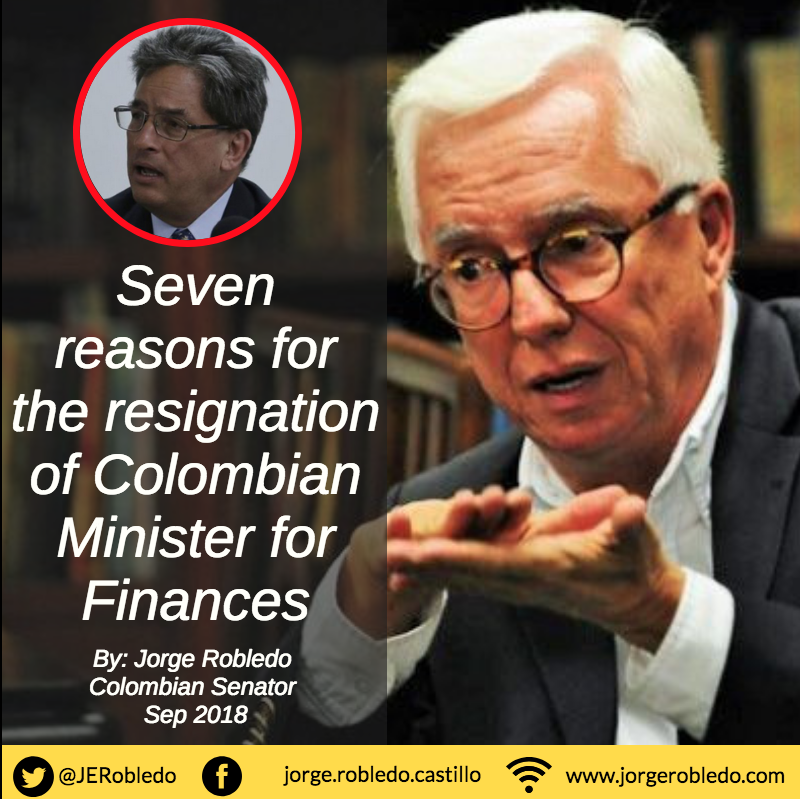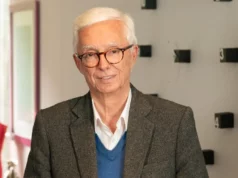Seven reasons for the resignation of Colombian Minister for Finances
Carrasquilla’s compromises against 117 poor municipalities in Colombia are contrary to President Duque promise that “he who brakes the law pays the price”.
By: Jorge Enrique Robledo / @JERobledo
- The national government had to rescue, at a cost of 495 billion pesos (164.million dollars) for the treasury, 117 municipalities that could not pay the 440 billion that lent them with the so-called Carrasquilla Bonds. And they burst because they imposed a very high real interest rate, in addition to inflation, between 11 and 17 percent, percentages of usurious level that grew even knowing that the risk of the lender was equal to zero, given that the Colombian Government would pay the debts.
- The worst of these loans is that they were not conditioned to serious previous studies, so it ended up going the obvious: a huge percentage of the aqueducts and sewage systems failed, in whole or in part, due to administrative disarray and corruption, that those municipalities do not enjoy the infrastructure works they keep paying for, nor do they have what to do with them. Such was the cruelty against them, that the debt was agreed to 19 years without being able to change the deadline or pay in advance (https://bit.ly/2MxONCW).
- The so-called Water Bonds -as they named the used loan- would ended up be called “Carrasquilla Bonds” not by mistake, but because this onerous business was devised, structured, and promoted by Alberto Carrasquilla, who also intermediated the foreign money that gave him life. You must ignore a lot or be very closed accomplice to deny that Carrasquilla was the intellectual author of the great swindle that they signed with these municipalities.
- In addition to earning what was surely an important amount for structuring and developing the business- that came out of three percent or more of the interest rate paid by municipalities through intermediation: 70 thousand or more million pesos (around US$ 23 million in five years-, Carrasquilla won by other sides. Navemby-one of his companies- , its and its partners’ firm, Andrés Flórez and Lía Hennan, based in Panama, acted as intermediaries to bring from New York the money of the Infrastructure Financial Group (GFI) with which this great business was set up. And Andrés Flórez was the Trustor on behalf of the GFI, who in his representation agreed with the Fiduciary Alliance the terms of the bond business, service for which he charged, of course, how they charged for the intermediary of foreign capital that the Colombian Cristian Mürrle helped send the country. Carrasquilla already acknowledged that he did bring that money to Colombia. But what he has not explained is why they sent it first to Panama, when it was unnecessary, or how the capital and profits returned to New York, if they did, and if they paid the legal taxes in Colombia.
- Daniel Coronell demonstrated that if the name of Alberto Carrasquilla appeared in the Panama Papers -in the office of the well-known cheater Mossak Fonseca-, it was not for the innocent reasons he gave to deceive. Coronell published a letter from Andrés Flórez to Mossak Fonseca in which he, scared, informs him that the bank BBVA del Peru refused to do a business with their company, Konfigura Capital, because it was linked to a mayor famous for being a corrupt in that country, which also led to the knowledge that Carrasquilla had lied about the stock compositions of Konfigura and Nabemby (https://bit.ly/2oVRdC4).
- Carrasquilla was able to set up the bond business because, when he was Álvaro Uribe’s finance minister, he promoted a modification of the Constitution -which led to a later change in the law- without which this business could not have been carried out and for which he created the mentioned firms. The disgusting revolving door through which they pass from public to private businesses and vice versa, always for the benefit of them and their cronies! The authorities must establish the legality of these acts, but even if they were legal, it does not take the corruption away from them, even in the terms of the World Bank and the OECD, defining corruption as taking advantage of power for personal benefit or that of third parties.
- If this scandal that comes from years ago was made public again it is because Iván Duque, who has more friends as neoliberals as Carrasquilla, had the nerve to name him minister and is defending him, when it is evident that his compromises against 117 poor municipalities of Colombia are contrary to the president´s promise to make pay a high price to all of those braking the law.
Bogotá, September 14, 2018.




